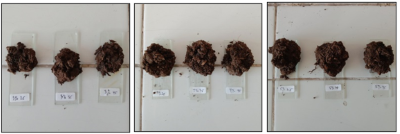Effect of Polyvinyl Alcohol (PVA) Concentration and Stirring Time on The Mechanical Properties of Biodegradable Plastic from Kepok Banana Peel Starch
DOI:
https://doi.org/10.24036/cived.v10i3.499Keywords:
Poluvinyl Alcohol, Kepok Banana Peel, Stirring Time, Bioplastics, Mechanical PropertiesAbstract
One solution is to use bioplastics, which can replace synthetic plastics that are difficult to decompose. Starch is one of the materials used in the manufacture of bioplastics because it is naturally degradable. However, bioplastics made from starch tend to be brittle and easily damaged, so additional materials are needed to overcome this problem. Polyvinyl alcohol (PVA) is one of the materials used in the manufacture of bioplastics because it has properties that can be degraded naturally, is non-toxic, and is able to form good quality plastic films. This study aims to examine the effect of PVA concentration and stirring time on the mechanical properties of biodegradable plastic derived from kepok banana peels. This study used a completely randomized design with three variations of PVA concentration (3%, 4%, and 5%) and three variations of stirring time (25 minutes, 35 minutes, and 45 minutes). The results showed that at a PVA concentration of 5% with a stirring time of 45 minutes, bioplastics showed the best quality with a tensile strength value of 2.25 MPa, the best elongation at break was 416%, and the best elasticity was 0.541. In biodegradation, all samples were completely degraded within 7 days. It can be included that the addition of PVA concentration and the length of stirring effecth the mechanical properties of bioplastics but not on the biodegradation test.
Downloads
References
S. B. Borrelle et al., “Predicted growth in plastic waste exceeds efforts to mitigate plastic pollution,” Science (80-. )., 2020, doi: 10.1126/SCIENCE.ABA3656.
S. Arum, L. Kusumastuti, and E. Kusumastuti, “Pembuatan Dan Karakterisasi Bioplastik Limbah Biji Mangga Dengan Penambahan Selulosa Dan Gliserol,” Indones. J. Chem. Sci., vol. 3, no. 2, pp. 157–162, 2014.
A. S. More, C. Sen, and M. Das, “Development of Starch-Polyvinyl Alcohol (PVA) Biodegradable Film: Effect of Cross-Linking Agent and Antimicrobials on Film Characteristics,” J. Appl. Packag. Res., vol. 9, no. 3, p. 1, 2017.
S. F. Limbong, B. A. Harsojuwono, and A. Hartiati, “Pengaruh Pengaruh Konsentrasi Polivinil Alkohol dan Lama Pengadukan Pada Proses Pemanasan terhadap Karakteristik Komposit Biotermoplastik Maizena dan Glukomanan,” J. Ilm. Teknol. Pertan. Agrotechno, vol. 7, no. 1, p. 37, 2022, doi: 10.24843/jitpa.2022.v07.i01.p05.
E. P. D. Putra and H. Saputra, “Karakterisasi Plastik Biodegradable Dari Pati Limbah Kulit Pisang Muli Dengan Plasticizer Sorbitol,” J. Teknol. Pertan. Andalas, 2020, doi: 10.25077/jtpa.24.1.29-36.2020.
T. Rachman, “Pengaruh Volume Gliserol Dan Waktu Pengadukan Terhadap Kualitas Bioplastik Dari Limbah Nata De Coco,” Angew. Chemie Int. Ed. 6(11), 951–952., 2018.
F. Sarlinda, A. Hasan, and Z. Ulma, “Pengaruh Penambahan Serat Kulit Kopi dan PVA terhadap Karakteristik Biodegradable Foam dari Pati Kulit Singkong,” J. Pengendali. Pencemaran Lingkung., 2022, doi: 10.35970/jppl.v4i2.1430.
Y. Darni and H. Utami, “Studi Pembuatan dan Karakteristik Sifat Mekanik dan Hidrofobisitas Bioplastik dari Pati Sorgum,” J. Rekayasa Kim. dan Lingkung., vol. Vol. 7, no. No. 4, pp. 190–195, 2010.
R. Handayani and M. Yuniwati, “Pengaruh Suhu dan Waktu Terhadap Kuat Tarik pada Proses Pembuatan Plastik dari Ganas (Gadung dan Serat Daun Nanas),” J. Inov. Proses, 2018.

Downloads
Published
How to Cite
Issue
Section
License
Copyright (c) 2023 Monica Anatasya Doni, Riri Jonuarti, Ratna Wulan, Fadhila Ulfa Jhora

This work is licensed under a Creative Commons Attribution 4.0 International License.







2.jpg)
